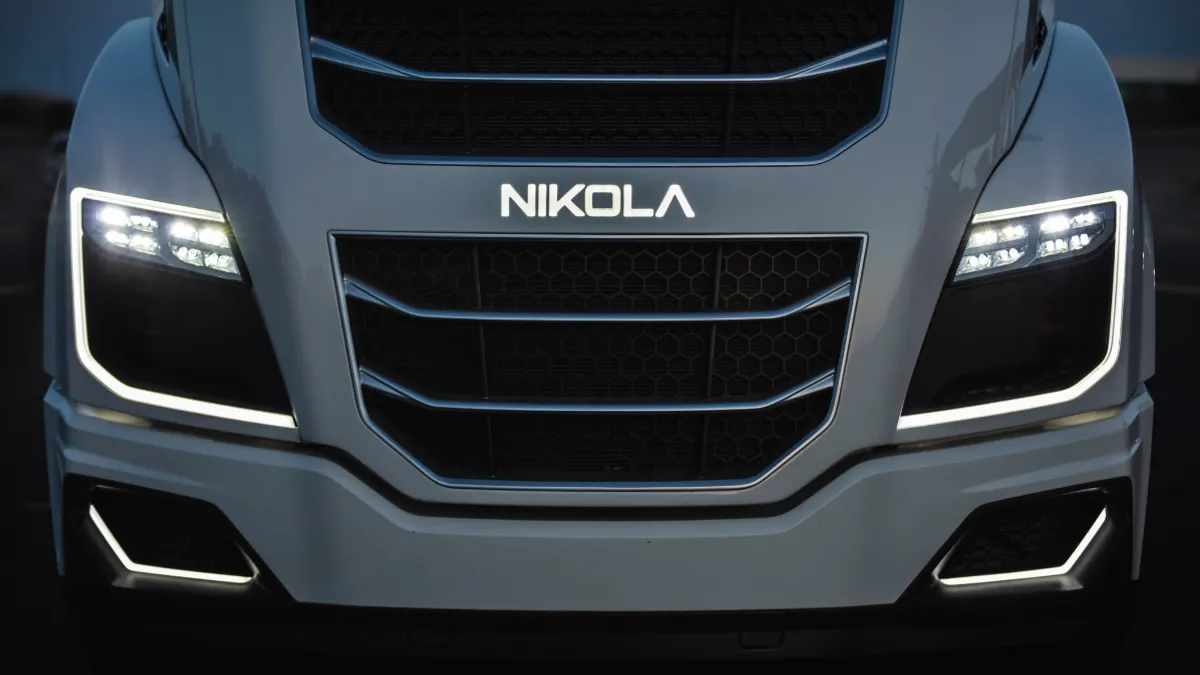UPDATE: Dec. 22, 2021: Nikola will pay $125 million to settle charges that it misled investors about products and commercial prospects, the Securities and Exchange Commission said Tuesday. Nikola did not admit nor deny the SEC's findings that Nikola violated federal securities laws. But the company did agree to cease and desist from future violations.
Dive Brief:
- Trevor Milton, the once high-flying founder and former chairman of Nikola, was indicted on Thursday, charged with two counts of securities-related fraud and one count of wire fraud by the United States Department of Justice.
- Milton resigned his position in the company in September after a bombshell report by Hindenburg Research, a firm with short positions in Nikola's stock. The research firm alleged Milton exaggerated the capabilities of the OEM's trucks. Nikola kept Mark Russell as CEO and continued its mission to build and sell Class 8 tractors that were either fuel-cell electric vehicles or battery-electric vehicles.
- Milton is alleged by the Justice Department to have faked various aspects of its models' capabilities. The DOJ confirmed reports that Milton spread misleading videos of the Nikola One "driving on its own power down a road with no incline." But U.S. attorneys alleged the Nikola One model was, in reality, towed to the top of hill, "at which point the 'driver' released the brakes, and the truck rolled down the hill until being brought to a stop in front of the stop sign."
Dive Insight:
From its earliest beginnings, Nikola tried to position itself as the leader in FCEVs — hydrogen-fueled tractors that would do something that electric trucks couldn't: travel long range, refueling at stations that Nikola said it would build.
But the Hindenburg report, and now Milton's indictment, could cloud the future of EVs in the Class 8 market. Milton played a strong role as a pitch man for Nikola. But trucking industry officials noted Nikola had yet to manufacture and sell a single FCEV to a fleet.
Yet Nikola was making deals and planning for the future. Just before the Hindenburg report dropped, GM and Nikola announced a partnership. The deal would save Nikola billions of dollars in factory construction and include Nikola's Class 8 and Class 7 manufacturing, the companies said. Their partnership had the potential to speed up production of Nikola's fuel-cell electric trucks and battery-electric trucks.
After the Hindenburg report, and Milton leaving the company, Nikola proceeded as if their founder was not facing serious issues, even as GM backed out of the deal. Nikola's future is now in the hands of Russell. The company is moving forward. In May, Total Transportation Services, a California company that services the ports of Los Angeles and Long Beach, agreed to order 100 battery-electric vehicles and fuel-cell-electric vehicles from Nikola.
The future of trucking, it seems, is still electric, and the work Nikola did up until the report still has value to some firms, as the government and consumers eye an electric future. Still, shares of Nikola, traded on Nasdaq, dropped more than 15% on Thursday.
As for the electric and hydrogen sectors, they will weather the latest storm, said Avery Vise, FTR vice president of trucking.
OEMs are under pressure to transition tractors to electric. In California, for example, the California Air Resources Board passed its Advanced Clean Trucks regulation. By 2045, every new truck sold in California will have to be zero-emission.
Vise said startups and major existing OEMs, such as Daimler Trucks, are not nervous about the future or feasibility of BEVs and FCEVs.















